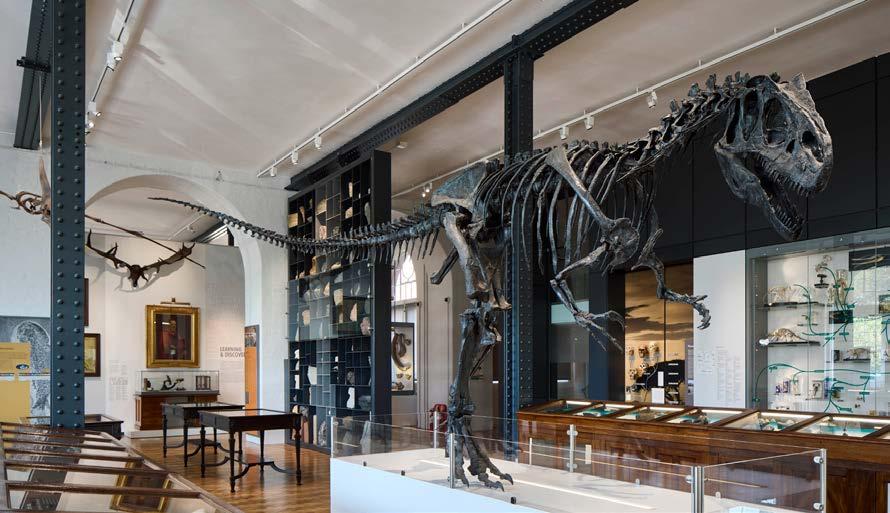


Discover our




Discover our
Discover the environmental challenges of today with our flexible, interdisciplinary degree programmes, spanning natural, physical, and social sciences.
From undergraduate to postgraduate taught, our courses offer unique opportunities to explore and address global issues.
Explore our undergraduate degrees in geography, Earth sciences and environment and ecological and environmental sciences.
Explore our postgraduate degrees and address issues related to sustainability, climate change, natural resources, and environmental hazards.
Saturday 5 October 2024
Saturday 26 October 2024
Book your place now https://edin.ac/UGOpenDays
Book your place now https://edin.ac/PGTOpenDays
Learn more about our degrees ed.ac.uk/geosciences/study/degrees

Welcome to our 2024/25 guide to studying geography at university, where we delve into the myriad opportunities and advantages this vibrant and dynamic field offers. In an era defined by complex global challenges, geography has emerged as an essential discipline, addressing critical issues that impact both humanity and the environment.
Within these pages, you’ll hear from current undergraduate and postgraduate geography students who share their educational journeys, insights, and experiences. Their stories will provide a glimpse into the academic and practical aspects of studying geography. Additionally, we showcase inspiring profiles of geography alumni who are thriving in various careers, offering a glimpse of the exciting possibilities a geography degree can provide.
We have hear from Dr Nerea Amisi Okong’o, Senior Tutor in Geography at the University of Manchester, who offers her expert insights into the field
As you consider your future in geography, this guide will help you make informed decisions and inspire you to embark on a remarkable academic journey.
There is also much more information on university life in our full Study Geography section on our website –www.geographical.co.uk.
Grace Gourlay, editor, Study Geography



Gain the knowledge and skills to tackle global priority issues, such as the climate crisis, social inequality and hazard vulnerability, and play your part in creating sustainable futures for all.
• Geography BA / BSc (Hons)
• Geography with Year in Industry BA / BSc (Hons)
• Geography with Year Abroad BA / BSc (Hons)
Specialist pathways available in human geography, physical geography, or natural hazard management
Outstanding levels of student satisfaction, including in knowledge and skills development, learning opportunities, marking and assessment fairness, organisation and management, and subject explanation*
1st in North West England for student satisfaction Complete University Guide 2025 Geography & Environmental Science
Work placements built in to every course
Fieldwork opportunities in each year of study
Career support from day one
*Ranked 1st (highest positivity score in the UK) in ten questions (1, 5-7, 9, 11, 17, 20, 24, 27) and in ‘Learning opportunities’ and ‘Organisation & Management’ themes (2024 National Student Survey, CAH2 Geography, earth & environmental sciences)

From placemaking and sustainable development to managing natural hazards, our geography degrees take you out of the classroom and into diverse landscapes for hands-on learning.
Together, we’ll tackle the social, political, economic and environmental challenges facing people and planet for a sustainable future.

Geography is a multifaceted discipline that explores physical landscapes, human interactions, and our complex relationships with the environment. Its broad scope offers something for everyone
In a rapidly evolving world, geography provides critical insights into the interactions between people, places, and environmental processes. As a prospective geography student, you’ll have many decisions to make, including whether to focus on physical geography, which examines natural landscapes and processes, or human geography, which explores the social and cultural dynamics shaping our societies. Geography’s broad scope encompasses everything from environmental science to global development, providing diverse avenues for academic exploration. This flexibility allows you to tailor your studies to your passions, equipping you with the knowledge to address pressing global challenges and make a meaningful impact in the world.
Human geography delves into the intricacies of society, examining populations, cultures, economies, and political structures. By understanding how humans interact with their environments, we can better address issues like economic inequality, urban planning, and sustainable development. For instance, human geographers might study the factors contributing to urban sprawl and develop strategies for more sustainable cities. They might also analyse the impact of globalisation on cultural diversity and propose ways to preserve local traditions.
Physical geography, on the other hand, explores the Earth’s natural processes, from geological formations to climatic patterns. This knowledge is essential for conservation, land management, and disaster preparedness. Physical geographers apply their skills to real-world problems, such as mapping topography for infrastructure projects or investigating the impact of climate change on coastal ecosystems. They might also study the formation of mountains, the erosion of coastlines, or the patterns of precipitation.
Environmental science, a field that bridges human and physical geography, focuses on the interactions between humans and the natural environment. Climate change, pollution, deforestation, and biodiversity loss are just a few of the pressing issues addressed by environmental geographers. Their expertise is crucial for developing sustainable solutions and informing policy decisions. For example, environmental geographers might study the effects of deforestation on local ecosystems and propose strategies for reforestation. They might also analyse the impact of pollution on water quality and develop plans for remediation.
Climate change, a defining challenge of our time, requires a comprehensive geographical understanding. Climate change geographers investigate its impacts on specific regions, communities, and ecosystems, while also exploring underlying causes like greenhouse gas emissions and deforestation. This interdisciplinary approach equips students with the skills to contribute to global efforts for emissions reduction, renewable energy development, and climate adaptation.
Geography education emphasizes hands-on learning through fieldwork and practical applications. This experiential approach allows students to develop transferable skills that can be applied directly to professional settings. Geographers excel at bridging the gap between theory and practice, whether it’s conducting environmental assessments, mapping vulnerable regions, or analysing population patterns. Geography graduates possess a wide range of transferable skills that are highly valued by employers across various sectors. Their ability to think critically, analyse complex data, and communicate effectively makes them strong candidates, with graduates often finding employment in government agencies, nonprofit organisations, consulting firms, and research institutions. Notably, they enjoy a diverse range of career options, competitive salaries, and rapid progression to more senior roles. In fact, geographers had the joint highest full-time employment rate for social sciences in 2019/20, at 54.9 per cent, compared to an average rate of 50.1 per cent. This strong employment rate, coupled with the fact that geography graduates have some of the highest salaries in the social sciences, confirms the geography is great option. Many geography programmes offer opportunities for students to gain practical experience through placements and a year abroad. These experiences can be invaluable in developing professional skills, building networks, and gaining a global perspective. Placements typically involve working in a relevant field, such as environmental consulting or urban planning, under the supervision of experienced professionals. Yearabroad programmes allow students to study at a foreign university, immerse themselves in a different culture, and conduct research on international issues. Beyond its practical applications, geography fosters a deep appreciation for the natural world and the diverse cultures that inhabit it. It encourages students to become informed citizens who can contribute to the well-being of their communities and the planet. By studying geography, you’ll gain a unique perspective on the world and develop the skills to make a positive impact. Embracing this field opens doors to a wide range of careers that address global challenges and promote sustainable development.

Agnes Jones
BA Geography with International Study University of Manchester
This past year I’ve had the pleasure of being the President of Manchester University Geographical Society (MUGS). MUGS is the oldest society at UoM and is arguably the best part of the degree experience. The students and the staff that make up the Geography Department are incredibly well connected thanks to MUGS. We have sports teams that play in the campus leagues and run regular socials, including the end of year Globall, This year we have put more focus into running academic events that directly benefit students. We have organised career talks, and even taken students to academic conferences, including full funding. Not only leading the society, but also being a member, has given me the opportunity to meet such a wide range of Geographers. It has truly been the most enjoyable and rewarding part of university so far. Whichever university you study at, I wholeheartedly recommend that you join their geography society. n
Joe Thomas BSc Geography Newcastle University
I never originally intended to study geography. An excellent A-Level teacher and a year spent in the stunning landscapes of the Canadian Rockies changed my mind. A few frantic calls to get a place at Newcastle University on clearing and I was set.
I’ve spent my degree so far on a primarily physical geography pathway, which has given me a new perspective on the natural world. Newcastle’s degree programme is heavily research based, which I’ve benefitted from. The support from my university has allowed me to explore some stunning locations: the Northumberland coast, the Lake District and Donegal to name a few. I’ve just finished a month-long research expedition to Kangerlussuaq in Greenland with five other students. We’ve studied the impacts of climate change on Russell Glacier, an outlet to the Greenland Ice Sheet, by quantifying and mapping glaciological, geomorphological, and biogeographical processes. Undoubtedly, studying geography at university has broadened and deepened my perspectives on the world and I’d love to continue studying it further. n



Explore earth, its climate and its environments, with flexible, tailored geography and geology degree courses at Edge Hill University.
- Fully-funded field trips, carefully selected to reduce our carbon footprint, will feed your curiosity
- Training in industry-standard field, laboratory and computing equipment, such as drone and laser-scanning technologies
- Career-focused learning and employability activities embedded across all three years


After completing BA in Sociology from Moi University in Kenya, I worked in the international development sector in project management, grants and fundraising. In particular, my third sector experience was in human rights, specifically the rights of the black African woman and black women rights defenders. It was a wonderful field of work and I got to meet incredible women making change at a grassroot and international level. When oil was discovered in commercial quantities in my home country of Kenya, I was struck by the realisation of the ways in which the black African woman was still in the periphery within traditionally male dominated sectors such as extractives. This resonated well with my struggle to break through into the global education system. One thing that comes with being of African descent is the ways in which education is privileged and although I had my personal dreams of changing the world, even with my parents assets I couldn’t afford to study abroad and so I was glad when I got a scholarship from Tullow Oil through the British Council which made it possible for budding scholars like me to pursue our academic dreams at out chosen worldclass universities. That is how I ended up with a MSc in
CV: DR NEREA AMISI OKON'O
n Senior tutor in geography, University of Manchester
n BA in Sociology, Moi University
n MSc in Sustainability , the University of Leeds
n PhD Human Geography, University of Sheffield
Sustainability (Environment and Development) from the University of Leeds, a step that inched me closer to my true calling – a PhD in human geography. So, I would say that everyone’s path is different and as a prospective university student, it is important to follow your own path and even if things aren’t as clear as they should be, remember life is not a straight journey. Your own personal career path may only become clearer once you’ve experienced various aspects of your journey.
Today as a human geographer, my main interests are still aligned with my initial focus from all those years ago –making the world a better place for black African women. My teaching and research is primarily on postcolonial and feminist geographies. Through this, I have explored interesting themes in particular the spatial and temporal factors that shape the BAME (Black, Asian and Minority Ethnic), and BIPOC (Black and Indigeneous People of Colour) communities experiences both in indigeneous and diasporic spaces. The university classroom is a crucial place within which I explore these concepts through a codeveloped curriculum that taps into individualised student experience and relies on under-represented authors and perspectives. With black and postcolonial geographies gaining traction in mainstream geography in the past two decades, it is my hope that as we move into a more internationalised multicultural university future, we all can unpack and redefine what geography means to all of us. That is, recognising our individual and collective strengths in addressing the deficiencies in the curriculum and building a geography future that accounts for our unique


Our undergraduate degrees: Our masters degrees:
BA Geography
BSc/MGeogSci Geography
BA Global Sustainable Development
BSc/MEnvSci Environmental Science
We are experts in the fields of social justice and environmental change. We explore our dynamic, diverse world to address humanity’s greatest problems. Our innovative research and practice-based learning will equip you with distinct, relevant professional skills. Study with us and change the world. www.sheffield.ac.uk/geography geography@sheffield.ac.uk
MSc(Res) Polar and Alpine Change
MA International Development
MSc Environmental Change and International Development
MPH International Development

facebook.com/sheffieldgeography twitter.com/sheffieldgeog instagram.com/tuosgeography
Why study Geography at Sheffield?
Top 10 in the UK for Geography (Guardian University Guide 2023)
Top 50 in the world for Geography (QS World University Rankings by subject 2022)
One of the greenest cities in Europe, on the edge of the Peak District National Park
All core undergraduate residential field classes are fully funded by the department




Are you looking for more geography in your life? Tune in to The Geographical Podcast, brought to you by Geographical magazine.
Available at www.geographical.co.uk or wherever you get your podcasts, The Geographical Podcast features excerpts from the magazine as well as interviews and commentary from our contributors, geographers, scientists and more.

Scan me to access the podcast via Geographical.co.uk
Let the world come to you
Geography graduates have a high rate of employment success. Their comprehensive understanding of the world, coupled with a versatile skillset, positions them well for a variety of career paths
Geography graduates possess a versatile skillset, making them valuable candidates for a variety of careers. Their broad-based education encompasses physical landscapes, environmental processes, social interactions, and urban planning, which prepares them for roles in international relations, urban development, geopolitics, and sustainability. Moreover, their training in Geographic Information Systems (GIS) provides them with the technical proficiency to analyse and visualise spatial data, skills that are crucial in a world increasingly driven by data and technology.
According to the Royal Geographical Society, geography graduates consistently report high job satisfaction and strong career prospects. Their ability to synthesise information from multiple disciplines allows them to excel in roles that require both analytical thinking and a deep understanding of global issues. For example, in urban development, geography graduates are instrumental in designing smart cities that optimise resources and minimise environmental impact. In international relations, their knowledge of geopolitical dynamics enables them to contribute to policy-making and conflict resolution.
Their expertise is also critical in addressing global challenges such ase resource management, urbanisation, and climate change. Geography graduates are often at the forefront of efforts to create more sustainable and interconnected communities, applying their knowledge to real-world problems. Whether in academia, government, or industry, geography.

Sandor Petroczi
Founder of AccuCities
Physical Geography and Geographical Information Systems MSc at the University of Leicester
My passion for geography was ignited by the scientific and technical modules available at Leicester. I was particularly drawn to Digital Geography and Remote Sensing, realising my love for maps. Fieldwork, including an unforgettable trip to the California Drylands, enriched my understanding of physical processes. My MSc thesis on 3D GIS further cemented my interest in 3D modelling. My career started with a summer as a photogrammetric surveyor in London. After my MSc, I returned to the same consultancy, built their first GIS database, and became a product manager. Seven years ago, I founded AccuCities to fill a market gap. We’ve since grown, creating detailed 3D models for architects, tech companies, and more. Geography’s multidisciplinary nature has been crucial to my success. n
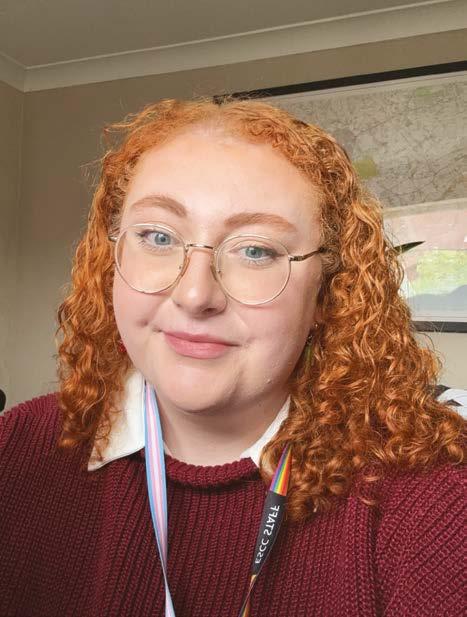

Hannah Procter
Planning
Officer
Geography at the University of East Anglia and working towards MA in Town and Country Planning at London Southbank University
My desire to study human geography was due to my keen interest in environmental conservation. It’s multi-disciplinary nature allowed me to explore a range of topics: from climate change and the Anthropocene, to energy and people. I feel that a degree in human geography gives you the tools which you can utilise in a variety of different careers. I most enjoyed learning about human interaction with the wider environment. This led has lead me to continue my studies in the form of a MA in Town and Country Planning, while working as an apprentice Town Planner at a Local Authority. n
Libby Davis
Emergency
Planning Officer
Geography at the University of East Anglia
As studying geography was the natural choice for me, driven by my fascination with natural hazards and their impact on communities. My A-Level geography teacher was the person to introduce me to the field of emergency planning – where the human and physical worlds intersect in preparation for and response to various hazards, both natural and man-made. Today, I am an Emergency Planning Officer for East Sussex County Council, fulfilling my dream career. My role is rewarding and varied: planning and responding to a wide array of threats and coordinating emergency exercises with multiple responder organisations to ensure preparedness. My geography degree provided me with a broad perspective on hazards, enhancing my ability to coordinate emergency response strategies. n

Jade Simone Silver
Catastrophe Modeller
Geography at The University of Birmingham
As a catastrophe modeller, part of my job is to use computer models that use the data clients give us to calculate how much money they may need to pay out in the event of a catastrophe (earthquake, hurricane, flood, terror attack) occurring. The output from the model is then passed onto actuaries who price how much insurance the client may need and that is fed back to the client. I chose to study geography at the University of Birmingham because there was opportunity to specialise in certain areas as I went through my degree, which I didn’t find elsewhere. I wanted to study geography because I was interested in the interplay between the natural environment and humans. n
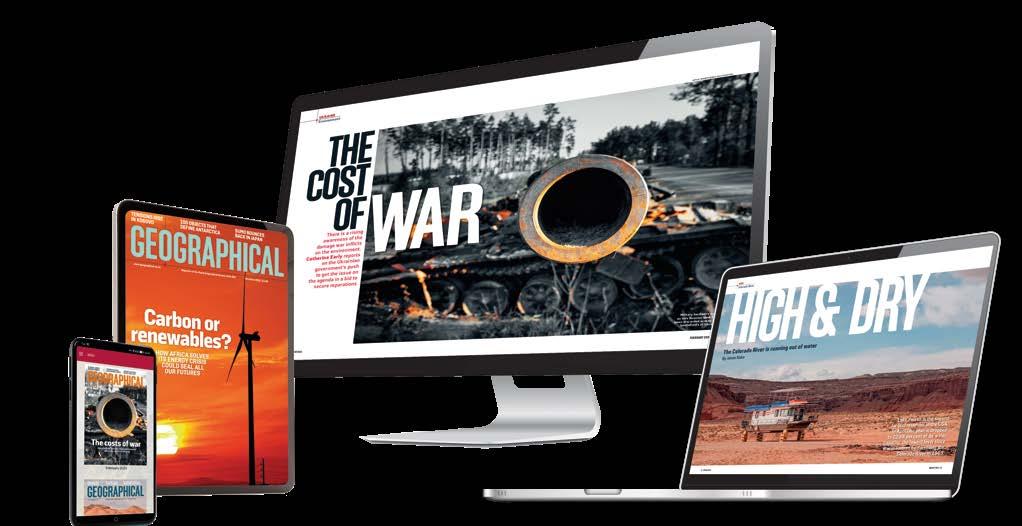
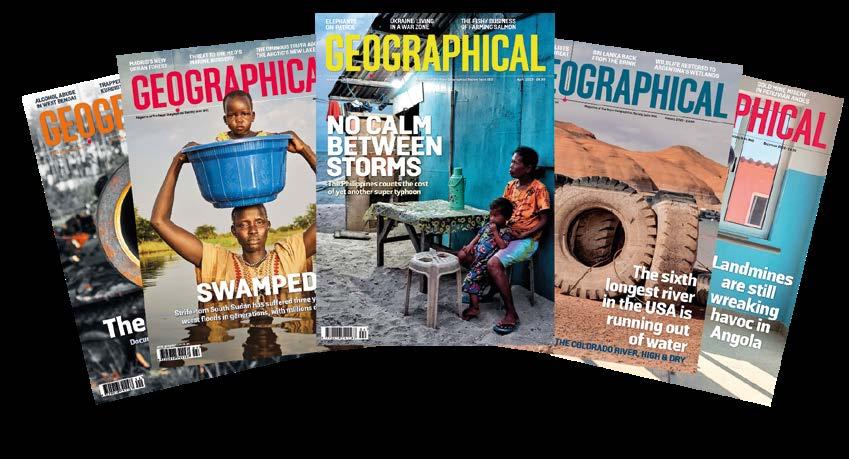

> Learn from the fantastic wealth of natural and built environments on our doorstep - study Geography in a stunning location between the mountains and the sea.
> We offer a range of courses accredited by the Royal Geographical Society in one of the oldest Geography and Earth Sciences departments in the UK.
> Our lecturers are internationally recognised researchers and work on projects across the globe.
> We offer field trips to outstanding local landscapes, as well as destinations across the UK and abroad.
BSc Geography (also available in Welsh) *
BSc Physical Geography *
BSc Environmental Earth Science
BSc Environmental Science
BA Human Geography *
BA Sociology
MSc Remote Sensing and GIS
MSc Behaviour Change
MA Society and Space
* Accredited by the Royal Geographical Society
> We provide a range of flexible learning opportunities, with four-year study options including foundation courses, an integrated year in industry or studying abroad. Discover more at an Open Day: 12 October I 9 November
Top 10 in the UK for Student Experience and Teaching Quality for the subject of Geography & Environmental Science
(Good University Guide 2024, The Times and Sunday Times)
Top in Wales for Student Satisfaction
(National Student Survey 2024)
Top in the UK for Student Life, and Lecturers and Teaching Quality
(WhatUni? Student Choice Awards 2023)
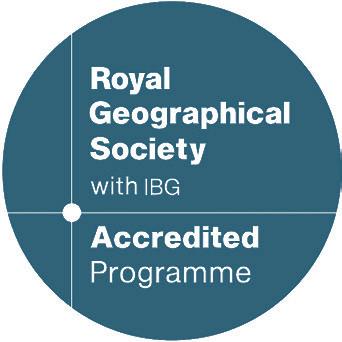
The universities offering undergraduate geography courses in the UK. Visit our website to see a full list of courses
Aberdeen – RGS Accredited
Teaching 90.4%, Continuation 97.3%, UCAS 174, Graduate 75%, Grades BBC
Aberystwyth – RGS Accredited
Teaching 93.2%, Continuation 96.5%, UCAS 122, Graduate 83%, Grades CCC-BBB
Bangor – RGS Accredited
Teaching 84.8%, Continuation 95.5%, UCAS 116, Graduate 83%
Bath Spa – RGS Accredited
Teaching 71.6%, Continuation 91.6%, UCAS 106, Graduate 77%, Grades BBB-BCC
Birmingham – RGS Accredited
Teaching 78.5%, Continuation 97.3%, UCAS 151, Graduate 90%, Grades AAB
Bournemouth – RGS Accredited
Teaching 85.3%, Continuation 89.2%, UCAS 103, Graduate 68%, Grades ABC-BCC
Brighton – RGS Accredited
Teaching 88.7%, Continuation 84.3%, UCAS 106, Graduate 67%, Grades BBB-BCC
Bristol – RGS Accredited
Teaching 80.6%, Continuation 99.7%, UCAS 164, Graduate 87%, Grades AAA-ABB
Cambridge
Continuation 100%, UCAS 197, Graduate 92%, Grades A*AA
Cardiff – RGS Accredited
Teaching 86.9%, Continuation 94.7%, UCAS
136, Graduate 84%, Grades ABB-BBB
Chester – RGS Accredited
Teaching 85.7%, Continuation 94.4%, UCAS 132, Graduate 72%, Grades BCC-BBC
Coventry – RGS Accredited
Teaching 97.5%, Continuation 95.9%, UCAS 113, Graduate 78%
Dundee – RGS Accredited
Teaching 86%, Continuation 94.7%, UCAS 185, Graduate 77%, Grades BBC-ABB
Durham
Teaching 90.3%, Continuation 99%, UCAS 172, Graduate 91%, Grades AAA
East Anglia – RGS Accredited
Teaching 82.6%, Continuation 96.1%, UCAS 134, Graduate 80%, Grades ABB
Edge Hill — RGS Accredited
Teaching 79.2%, Continuation 95.7%, UCAS 125, Graduate n/a, Grades DDD-CCC
Edinburgh – RGS Accredited
Teaching 93.2%, Continuation 98.6%, UCAS 185, Graduate 86%, Grades ABB-AAA
Exeter
Teaching 87.7%, Continuation 97.7%, UCAS 162, Graduate 84%, Grades ABB-AAB
Glasgow – RGS Accredited
Teaching 90.6%, Continuation 95.3%, UCAS 199, Graduate 83%, Grades BBB-ABB
Gloucestershire – RGS Accredited
Teaching quality The rating for the quality of teaching given by final year students.
Continuation Percentage of first year students continuing to second year. UCAS Typical UCAS scores of entrants
Graduate prospects Percentage of graduates who find graduate-level jobs, or are in further study at graduate or HE level, within 15 months of graduation. Grades The standard grades required to gain entry to a department/course.
Teaching 97.9%, Continuation 96.7%, UCAS 115, Graduate 72%, Grades CCC
Hertfordshire — RGS Accredited
Teaching 86.3%, Continuation 91.9%, UCAS
120, Graduate n/a, Grades BBC-BBB
Huddersfield – RGS Accredited
Teaching 98.1%, Continuation 94.4%, UCAS
107, Graduate n/a
Hull – RGS Accredited
Teaching 87.5%, Continuation 88.7%, UCAS 121, Graduate 83%
Keele – RGS Accredited
Teaching 91.3%, Continuation 95.2%, UCAS 116, Graduate 86%, Grades BBC
King’s College London – RGS Accredited
Teaching 81.5%, Continuation 96.2%, UCAS 154, Graduate 87%, Grades AAB
Lancaster – RGS Accredited
Teaching 95.5%, Continuation 97.4%, UCAS 149, Graduate 84%, Grades ABB
Leeds – RGS Accredited
Teaching 79.3%, Continuation 98.6%, UCAS 159, Graduate 87%, Grades AAB
Leeds Beckett
Teaching 85.1%, Continuation 89.9%, UCAS 107, Graduate n/a, Grades n/a
Leicester – RGS Accredited
Teaching 84.8%, Continuation 95.2%, UCAS 126, Graduate 73%, Grades ABB
Lincoln – RGS Accredited
Teaching 89%, Continuation 97.8%, UCAS 117, Graduate 82%
Liverpool – RGS Accredited
Teaching 76.6%, Continuation 97.6%, UCAS 134, Graduate 81%, Grades BBC
Liverpool Hope – RGS Accredited Teaching 87.5%, Continuation 98.1%, UCAS 110, Graduate n/a
Liverpool John Moores – RGS Accredited
Teaching 86.2%, Continuation 94%, UCAS 117, Graduate 75%, Grades BBC-ABB
London School of Economics
Teaching 88.5%, Continuation 98.8%, UCAS 178, Graduate 92%, Grades AAA
Loughborough – RGS Accredited
Teaching 93.6%, Continuation 98.5%, UCAS 154, Graduate 87%, Grades AAB
Manchester
Teaching 83.4%, Continuation 97.2%, UCAS 157, Graduate 84%, Grades AAB
Manchester Metropolitan – RGS Accredited
Teaching 86.7%, Continuation 89.7%, UCAS 116, Graduate 81%, Grades BCC
Newcastle – RGS Accredited
Teaching 83.7%, Continuation 97.5%, UCAS 136, Graduate 83%, Grades ABB
Northampton– RGS Accredited
Teaching 90.3%, Continuation 97.3%, UCAS n/a, Graduate n/a, Grades BCC
Northumbria – RGS Accredited
Teaching 88.9%, Continuation 92%, UCAS 126, Graduate 75%, Grades n/a
Nottingham – RGS Accredited
Teaching 84.2%, Continuation 98.5%, UCAS 146, Graduate 81%, Grades AAB
Nottingham Trent – RGS Accredited
Teaching 86.7%, Continuation 92.7%, UCAS 119, Graduate 72%, Grades n/a
Oxford Teaching 92.1%, Continuation 99.4%, UCAS 197, Graduate 91%, Grades A*AA
Oxford Brookes – RGS Accredited
Teaching 78.1%, Continuation 96.7%, UCAS 113, Graduate 68%, Grades BCC
Plymouth – RGS Accredited
Teaching 85.7%, Continuation 94.9%, UCAS 123, Graduate 74%, Grades n/a
Portsmouth – RGS Accredited
Teaching 88.8%, Continuation 93.2%, UCAS 124, Graduate 82%, Grades BBB-BCC
Queen Mary, London — RGS Accredited
Teaching 73.7%, Continuation 97%, UCAS 128, Graduate 75%, Grades ABB
Queen’s University Belfast – RGS Accredited
Teaching 85%, Continuation 96.9%, UCAS 144, Graduate 72%, Grades BBB
Reading — RGS Accredited
Teaching 83%, Continuation 97.7%, UCAS 119, Graduate 75%, Grades BBB
Royal Holloway – RGS Accredited
Teaching 91.7%, Continuation 95.5%, UCAS 134, Graduate 79%, Grades ABB-BBB
Salford – RGS Accredited
Teaching 81.7%, Continuation 93%, UCAS 104112, Graduate n/a, Grades n/a
Sheffield – RGS Accredited
Teaching 90.8%, Continuation 99.2%, UCAS 152, Graduate 82%, Grades AAB
Sheffield Hallam – RGS Accredited
Teaching 81.9%, Continuation 64.9%, UCAS 107, Graduate 74%, Grades BBC-BBB
South Wales – RGS Accredited
Not included in surveys
Southampton – RGS Accredited
Teaching 88.6%, Student experience 86.8%, UCAS 143, Graduate 78%, Grades ABB-AAB
St Andrews – RGS Accredited
Teaching 88.4%, Continuation 98.4%, UCAS
211, Graduate 85%, Grades AAA-ABB
Stirling
Teaching 88.6%, Continuation 94.8%, UCAS 182, Graduate 68%, Grades BBB
Sussex
Teaching 93.5%, Continuation 95.9%, UCAS 133, Graduate 74%, Grades ABB
Swansea – RGS Accredited
Teaching 91.9%, Continuation 95.4%, UCAS 134, Graduate 72%, Grades n/a
University College London
Teaching 88.1%, Continuation 98.4%, UCAS 173, Graduate 87%, Grades AAA
Ulster – RGS Accredited
Teaching 81.7%, Continuation 95.5%, UCAS 137, Graduate 74%, Grades BCC
UWE Bristol – RGS Accredited
Teaching 94.6%, Continuation 91.7%, UCAS 111, Graduate 73%, Grades n/a
Warwick
Teaching 92.5%, Continuation 96.1, UCAS 178, Graduate 90%, Grades AAB
Winchester – RGS Accredited
Teaching 82.3%, Continuation 95.8%, UCAS 125, Graduate 70%, Grades BBC-BBB
Worcester – RGS Accredited
Teaching 73.4%, Continuation 94%, UCAS 110, Graduate 80%, Grades BBB-BCC
York
Teaching 85.4%, Continuation 97.8%, UCAS 146, Graduate 75%, Grades AAB
York St John – RGS Accredited
Teaching 88.7%, Continuation 88.5%, UCAS 104, Graduate 72%, Grades n/a
Sources: Teaching and students: National Student Survey (NSS).
UCAS: This is the average new UCAS tariff score for new students under the age of 21 taken from Higher Education Statistics Agency (HESA) data.
Graduate prospects: This is the percentage of graduates undertaking further study or in a professional job, in the annual survey by HESA six months after graduation
Aberdeen Geophysics; Geographical Information Systems; Integrated Petroleum Geoscience; Rural Surveying & Rural Property Management; Sustainability Transitions; Environmental Science; Environmental Management; International Relations and International Law
Aberystwyth Biodiversity and Conservation Management; International Politics; International Relations; Remote Sensing and GIS; Society and Space;
Anglia Ruskin Sustainability
Bangor Conservation and Land Management; Wildlife Conservation; Environmental and Business Management; Environmental Forestry; Environmental Management; Forestry and Environmental Management
Bath Spa Environmental Humanities
Birkbeck, London Geography; Environment and Sustainability; International Development; Climate Change; International Development and Social Justice; Geographic Data Science; Sustainable Cities
Birmingham Research in Human Geography; Geography and Environmental Sciences; Environmental Health; Health, Safety and Environment Management; River Environments and their Management
Brighton Ecology and Conservation; Water and Environmental Management; Geographical Information Systems and Environmental Management; Environmental Sciences; Environmental Politics; Ecology and Conservation; Geoscience; Geoarchaeology; GIS and Remote Sensing; Globalisation
Bristol Geographical Sciences; Global Challenges; Human Geography: Society and Space; Development and Security; Climate Change Science and Policy; Environmental Policy and Management; Geographic Data Science and Spatial Analytics; Sustainable Futures; Environmental Modelling and Data Analysis; Global Development and Environment; Environmental Humanities
Cambridge Geography; Environmental Policy; Climate, Environment and Urban Policy; Quantitative Climate and Environmental Science
Cardiff Global Cultures; Global Ecology and Conservation; Spatial Planning and Development; Urban and Regional Development; Sustainability Planning and Environmental Policy; International Planning and Development; Environment and Development; International Planning and Urban Design
Coventry Sustainability and Environmental Management
Derby GeoEnergy; Sustainability and Environmental Management
Dundee Research Geography; Research Environmental Science
Durham Geography Research Methods; Human Resource Management; Environmental Humanities; Environmental Hazards and Risk; Risk, Security and Politics; Climate, Risk and Society; Environmental and Natural Resource Economics; Master of Data Science (Earth and Environment)
East Anglia Environmental Sciences; Global Development Management; Global Social Development; Globalisation, Business and Sustainable Development; Environmental Assessment and Management; Climate Change; Data Science for Environmental Science
Edinburgh Carbon Management; Earth Observation and Geoinformation Management; Environment and Development; Environment, Culture and Society; Environment, Protection and Management; Environmental Sustainability; GeoEnergy; Geographical Information Science; GeoSciences; Human Geography; Geographical Information Science; Data Science
Exeter Conservation Science and Policy; Environment and Human Health; Global Sustainability Solutions; Geographical Information Systems; Geography; Global Sustainability Solutions
Glasgow Earth Futures: Environments, Communities, Relationships; Environment & Sustainable Development; Environment and Sustainable Development; Earth Futures; Geospatial and Mapping Sciences; Geospatial Data Science and Modelling; Global Migrations and Social Justice; Human Rights and International Politics; Human Geography; Sustainable Tourism and Global Challenges; Sustainable Energy; Sustainable Water Environments; Urban Analytics; Urban Research; Urban Studies
Glasgow Caledonian Climate Justice; Environmental Management (Waste, Energy, Water, Oil and Gas); Environmental Forensic Analysis
Gloucestershire Geography; International Relations; Global Futures
Greenwich Global Environmental Change
Hertfordshire Data Science; Data Science With Placement Year; Sustainable Planning; Sustainable Planning and Transport; Water and Environmental Management; Environmental Management for Agriculture; Environmental Management; Research Human Geography; Research Physical Geography
Imperial College, London Environmental Technology; Environmental Engineering; Environmental Data Science and Machine Learning; Living Planet with Ecosystems and Environmental Change; Geotechnical and Geoenvironmental Engineering; Soil Mechanics and Environmental Geotechnics; Green Chemistry, Energy and the Environment Keele Biodiversity and Conservation; Geoscience Research; Human Geography and Sustainability Research; Environmental Sustainability and Green Technology
King’s College, London Geopolitics, Resources and Territory; Environment, Politics and Development; Sustainable Cities;
Environmental Science for Sustainability; Climate Change: Environment, Science and Policy; Environmental Science for Sustainability
Lancaster Conservation and Biodiversity; Environment, Culture and Society; Environment and Development; Environmental Management; Environmental Science
Leeds Energy and Environment; Environment and Development; Sustainability and Business; Sustainable Cities; Climate Futures: Science, Society and Politics; Environmental Engineering and Project Management; Geographical Information Science; Environment and Development; Geographical Information Systems
Leicester Environmental Data Science; Environmental Futures; Geographical Information Science; Geographical Data Science
Lincoln Geography; Research Physical Geography; Research Human Geography; Environment and Planetary Health
Liverpool Environment and Climate Change; Environmental Sciences; Geographic Data Science; Researching Crisis and Change in Human Geography; Environmental Assessment and Management
London School of Economics Human Geography and Urban Studies; Geographic Data Science; Environment and Development
Loughborough Climate Change Politics and Policy; Climate Change Science and Management; Environmental Monitoring, Research and Management; International Financial and Political Relations
Manchester Environmental Governance; Environmental Monitoring, Modelling and Reconstruction; Geographical Information Science; Global Development (Environment and Climate Change); Research Methods with Human Geography; Data Science (Environmental Analytics); Environmental Impact Assessment & Management; Global Urban Development and Planning; Pollution & Environmental Control; Urban Regeneration and Development; Global Development (Poverty and Inequality)
Newcastle Environmental Geoscience; Human Geography Research; Planning and Environment Research; Data Science; International Politics
Northumbria Disaster Management and Sustainable Development; Environmental Monitoring, Modelling and Reconstruction; International Development
Nottingham Environmental Leadership and Management; Climate Change, Environment and Society
Nottingham Trent International Development; Applied Ecology and Geospatial Techniques; International Relations and Security
Plymouth Human Geography Research; Sustainable Environmental Management; Environmental Geochemistry; Sustainable Environmental Management; Environmental Humanities; Environmental and Engineering Geology; Data Science and Environmental Intelligence
Portsmouth Geographical Information Systems; Environmental Geology and Land Contamination
Queen Mary, London Global Development; Geography
Queen’s University, Belfast Geopolitics; Climate Change; Environmental Engineering
Reading Environmental Management
Royal Holloway Global Health: Human Health and the Environment; Environmental Diagnosis and Management; Cultural Geography; Sustainability and Management; Geopolitics, Development, Security and Justice; Global Futures: Culture and Creativity; Global Futures: Geopolitics and Security; Global Futures: Justice, Development and Sustainability; Past Climate and Environmental Change
Salford Health and Global Environment; Environmental Assessment and Management; Sustainability; Wildlife Conservation
Sheffield International Development; Applied Geographical Information Systems; Environmental Change and International Development
Sheffield Hallam Geographical Information Systems
Southampton Environmental Consultancy; Environmental Monitoring and Assessment; Environmental Pollution Control; Energy and Sustainability: Energy, Environment and Buildings
St Andrews International Development Practice; Geography; Sustainable Development; Geochemistry
Stirling Environmental Management; Environmental Remote Sensing and Geospatial Sciences
Sussex Climate Change, Development and Policy; Environment, Development and Policy; Energy and Climate Policy; Global Health; Geopolitics and International Affairs; Migration and Global Development; Migration and Refugee Studies; Social Development; Sustainable Development; Sustainable Development (Online)
Swansea Environmental Biology: Conservation & Resource Management; Environmental Drone Remote Sensing; Environmental Dynamics and Climate Change; Geographic Information and Climate Change; Human Geography; Society, Environment and Global Change
UWE, Bristol Environmental Consultancy; Environmental Management; Sustainable Development in Practice
Warwick Environmental Bioscience in a Changing Climate; Environmental Humanities; Global Sustainable Development; Global Decarbonisation and Climate Change
York Environmental Economics and Environmental Management; Environmental Science & Management; Conservation Studies; Corporate Sustainability and Environmental Management; Sustainability Studies
York St John Environment and Social Justice
Discover the world’s most authoritative atlas, beautifully designed and fully updated – a benchmark of cartographic excellence from The Times

Available wherever books are sold, and online at collins.co.uk/TimesComprehensiveAtlas



Become part of a vibrant community of students and staff making real-world impact by addressing past, current and future challenges in the fields of geography, environmental science and urban planning.
Study one of our unique undergraduate programmes and start your journey!
• Geography
• Earth Sciences
• Environmental Sciences
• Urban and Regional Planning
• Environmental Change and Sustainability
We Inspire
We activate
birmingham.ac.uk/gees
Many of our programmes are also available with an integrated Masters, Year Abroad or Professional Placement Year. Field trip opportunities are available.
‘Myfavouritethingisthediversityand flexibilityofthecourse.Noothersubject offersyoualectureinthemorningabout glaciersandaseminarintheafternoonon prisonarchitecture!Youcanchoosefrom ahugerangeofmodulesmeaningthatyou onlystudywhatinterestsyou.’
Jemima BA Geography
